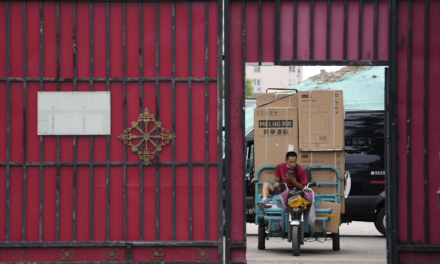Governor Maura Healey put numbers to her campaign promises on Wednesday, unveiling a $55.5 billion budget blueprint that would dramatically hike state spending on environmental and higher education initiatives, pour new money into child care, and begin parcelling out revenue from a new surtax on the wealthy.
While just an opening bid, Healey’s fiscal year 2024 spending plan reflects some of her early pledges, including one to provide $7,000 to households in need of emergency rental assistance. She proposed increasing spending on colleges and universities by nearly 25 per cent by locking in tuition prices for students in the state university system while boosting financial aid, and helping to pay for community college for students 25 years or older.
Her plan also would funnel $105 million more to energy and climate efforts, including hiring dozens of new “environmental justice” employees and tripling the budget for the Mass. Clean Energy Center with a $35 million infusion.
Healey’s administration did not include any proposals for new broad-based tax increases. Overall, Healey would spend roughly 4 per cent more over the current budget. Among the additional funds are $1 billion from the new constitutional amendment raising taxes on annual earnings above $1 million, the so-called millionaire’s tax approved by voters last fall.
Healey is filing the proposal in conjunction with a nearly $1 billion tax code overhaul she unveiled Monday. That package includes a proposal to combine two existing tax credits into one and give Massachusetts families $600 per child or dependent, as well as plans to slash the state’s tax rate on short-term capital gains and reshape Massachusetts’ estate tax — two proposals that have the backing of business leaders.
She said the state “emerged strong and on solid financial footing” from the COVID pandemic, justifying the growth in spending and accompanying tax package.
“There are people behind every number,” Healey said, holding up a hefty printout of the budget at a State House news conference.
Here are some highlights from the budget plan, which will now go to the Legislature:
Millionaires tax
Healey’s plan is the first to divvy up revenue from the millionaire’s tax, with proposals to spread $1 billion among education and transportation initiatives, including at least $186 million going to the MBTA and $360 million to higher education.
Narrowly passed by voters on the November ballot, the constitutional amendment increases the state’s 5 per cent income tax rate to 9 per cent on annual income exceeding $1 million, and could generate billions of new dollars for the state in the years ahead.
Healey and lawmakers agreed to use $1 billion this year from the new tax. The governor also proposed creating a separate trust fund for tax collections and designating the money specifically for education and transportation, as required by voters. Her administration said Wednesday that the new funding would be in addition to current spending on transportation and education.
For the next fiscal year, the largest chunk of the revenue from the new tax would go to higher education, including $93 million to expand financial aid and $59 million for a new initiative that would lock in tuition for students within the University of Massachusetts and state university systems, insulating them from any increases during their four years.
UMass president Marty Meehan — whom Healey’s budget secretary, Matthew Gorzkowicz, once worked under — backed the idea on Wednesday, saying it could also encourage more students to finish their degree.
The MBTA would also get $181 million from the millionaire’s tax for capital projects, and $5 million for what her administration described as startup costs for a means-tested fares program, which would cut fares for low-income riders.
Notably, just $10 million — or 1 per cent of the new revenue — would go toward the state’s K-12 schools, to fund an early college pathways program. Healey noted her budget elsewhere tabs nearly $6.6 billion for direct aid to local school districts, a roughly 10 per cent increase, arguing these spending items should be viewed in concert with one another, not separately.
“Also, we recognize that there are other needs out there,” she said of revenue from the millionaire’s tax.
Her plan would cap additional spending financed by the millionaire’s tax at 3 per cent a year and require a minimum balance in the new fund of at least one-third of the spending limit. For example, in addition to spending is limited to $1 billion this year, the fund would have to maintain a balance of at least $333 million. Then, in the fiscal year 2024, spending would then be capped at $1.03 billion, while the floor moves to $340 million. Any revenue collected beyond that annual limit, however, could then be used for one-time investments under Healey’s proposal.
The goal, administration officials said, is to put “safeguards” in place while the state gets a handle on how much the tax may ultimately generate from year to year. Revenue officials have said the new surtax could generate far more than is being budgeted, with anywhere from $1.4 billion to $1.7 billion coming in during the next fiscal year. But they also warn that it also relies on “highly volatile” capital gain collections that can fluctuate even in heady fiscal times.
The Raise Up Massachusetts coalition, which led the campaign to pass the constitutional amendment, criticized Healey’s budget proposal Wednesday, saying it “doesn’t come close to making the investments necessary” to address some of the state’s biggest challenges related to education and infrastructure.
“Instead, a massive permanent tax cut for the wealthy would most likely lead to catastrophic budget cuts the next time we hit a recession,” the group wrote in a statement.

Housing
The governor’s proposal includes funding for various housing-related campaign promises, including funding to create a Cabinet-level housing secretary, the first of its kind since the Dukakis administration.
The budget includes nearly $1 billion to create the new office, which will be dubbed the Executive Office of Housing and Livable Communities. A bill to enshrine the office in state law was expected to be filed Wednesday.
Healey also tries to address the burgeoning homelessness crisis by offering $7,000 per household in emergency rental assistance and $324 million for emergency assistance in family shelters.
The emergency assistance funding would give a boost to an overwhelmed system, providing 4,700 units of family shelter for homeless and migrant families, about 30 per cent more than this fiscal year’s baseline capacity.
Budget officials project the shelter system will likely serve about 338 additional families per month in the next fiscal year. On Tuesday alone, the state saw 14 new families enter the emergency assistance system.
It also includes funding to increase the number of vouchers for low-income tenants and people with disabilities. Gorzkowicz said the funding would help provide a “safety net for folks on the edge.”
Early education
Healey and legislative leaders have long called for fixes to the state’s childcare industry, which has been plagued with staffing shortages and long wait lists due to a lack of public funding.
In 2020, the Legislature created a commission to address the issue, which recommended $1.5 billion in additional funding to stabilize existing programs, raise subsidies, expand the number of families who can receive those subsidies, and increase pay for childcare workers.
Her budget proposal takes many of the recommendations into consideration and reflects her promise to address the languishing system.
She proposes $475 million to fund what are called C3 grants for childcare providers, both those that accept families that receive subsidies and those that don’t. Healey’s budget proposal also would expand a child and family tax credit to allow $600 per dependent — with no cap on the number of credits — to help families care for their children and elderly dependents.
Transportation
In her inaugural speech, Healey promised to propose funding for 1,000 more positions within the MBTA, though the agency has already struggled to fill its current vacancies.
But Healey’s plan does not include additional funding for the 1,000 new positions; instead, it includes funding “to help [the MBTA] hire” for the unfilled vacancies the agency already has, Healey aides said.
Her budget includes $529 million for the Department of Transportation, $100 million for local transportation projects, and $187 million in funding for the embattled MBTA, on top of what it would receive through the millionaire’s tax revenue. The agency, which is funded through a variety of other sources including a portion of the state sales tax revenue, has faced a slew of safety concerns due to ageing infrastructure, defects, and worker shortages.
Healey’s administration is also proposing $28 million to implement a new law that allows people without legal immigration status to apply for driver’s licenses and $500,000 to translate commercial driver’s license permit tests into eight languages.




